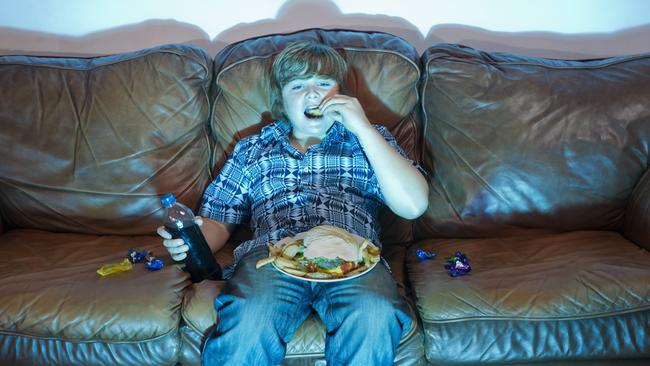Junk food TV ban to save kids from obesity: Deakin University researchers
BANNING junk food adverts on television until late at night could reduce childhood obesity and save almost $800 million in health-care costs, new economic modelling has found.
News
Don't miss out on the headlines from News . Followed categories will be added to My News.
BANNING junk food adverts on television until late at night could reduce childhood obesity and save almost $800 million in health-care costs, new economic modelling has found.
The ambitious plan would cost $6 million to implement and monitor, but Deakin University researchers will tell the European Congress on Obesity on Friday the flow-on effect of kids not being exposed to advertising of unhealthy foods on prime-time TV would see them consume 805kJ less per week, leading to a weight loss of 700g, and be value for money.
RELATED:
KIDS EAT MORE AFTER WATCHING JUNK FOOD ADS: RESEARCH
PARENTS’ FURY OVER MACCAS MEAL VOUCHERS
BAD DIETS AFFECT BRAIN BY DECREASING SELF-CONTROL
Lead researcher Dr Vicki Brown, who is presenting the findings in Vienna on Friday, said the proposal to restrict the TV promotion of foods high in fat, sugar and salt until after 9.30pm would save more than $780 million in health-care costs over the lifetime of these children, aged 5-15 years, through the prevention of obesity-related disease.
“TV advertising influences what foods kids prefer and what they eat, and we know that if you are overweight as a child, that is most likely the trajectory you follow into your adult life,” Dr Brown said.
While unhealthy food advertising is restricted in Australia for TV shows classified as children’s content, Dr Brown said most young people watched other types of programs, such as reality TV, sport and movies.
“We know that during the peak times, children watch TV they are exposed to up to 6.5 of these unhealthy ads per hour,” she said.
“The exposure is even greater for children from socio-economically disadvantaged areas, as they spend far more time watching TV.
“This ban would have 1.5 times greater benefits for the health of children from these disadvantaged groups.”

The findings, from the group at Deakin Health Economics and the university’s Global Obesity Centre, were published in the journal, Nutrients.
Australian Food and Grocery Council deputy chief Geoffrey Annison said there was limited evidence similar bans overseas had not reduced childhood obesity, and while there were restrictions on food companies, parents also had an important role to play.
“If such bans were introduced, it would mean you could see a double-choc brownie on MasterChef for an hour but you could not see a 30-second chocolate bar advertisement,” Dr Annison said.
“We need to be able to back the judgment of parents to determine what their children see during other TV programming times.”
These Deakin researchers last year calculated that a 20 per cent sugar tax would cost an average person $30 more a year but save the economy $1.73 billion in healthcare costs over the population’s lifetime.
They are compiling data to compare the most health-effective and cost-effective interventions across the board to present to the federal government later this year.


